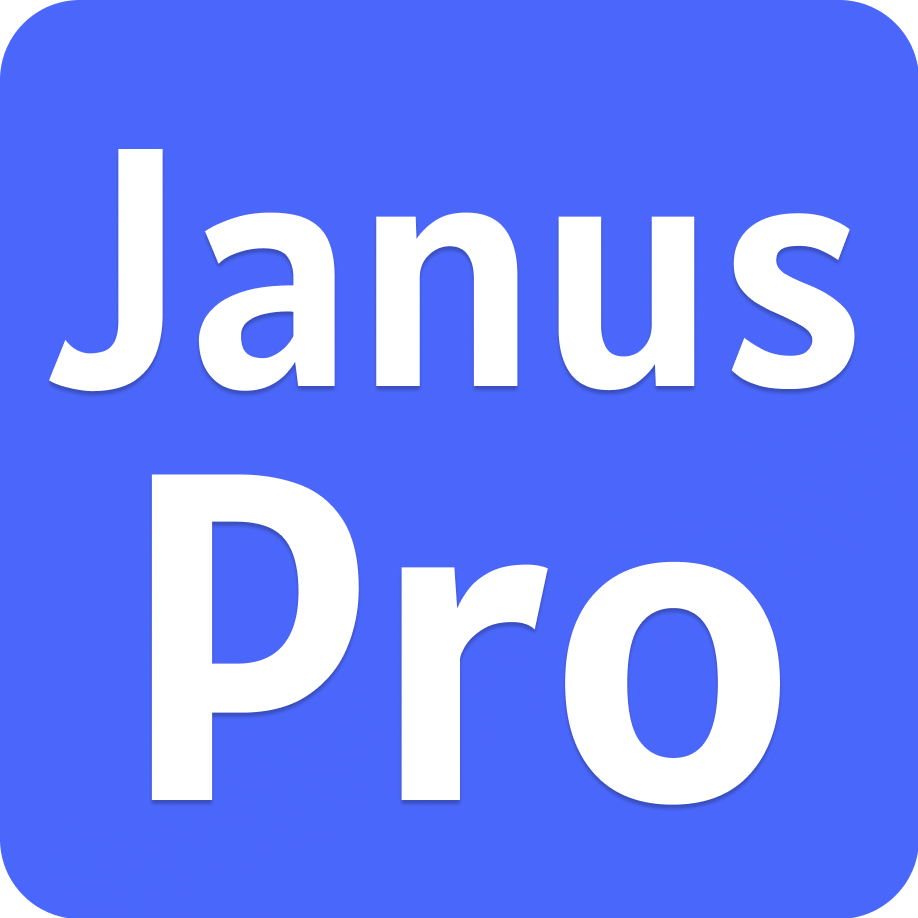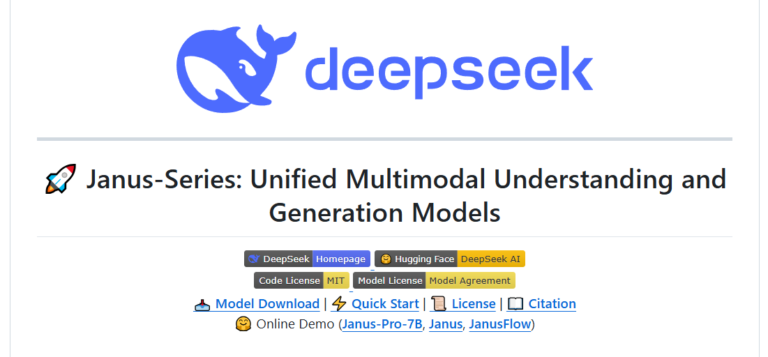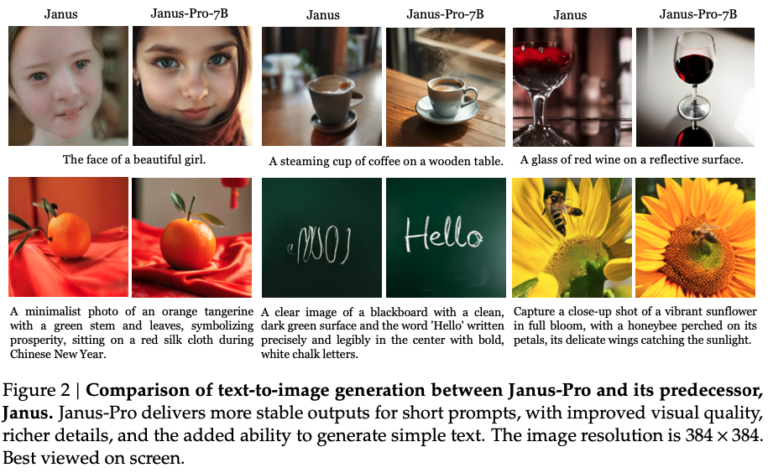Introduction: Revolutionizing Knowledge Sharing
Elon Musk is known for challenging the status quo in numerous industries, from electric cars with Tesla to space exploration with SpaceX. Now, he’s set his sights on transforming the world of knowledge-sharing with his latest project, Grokipedia.
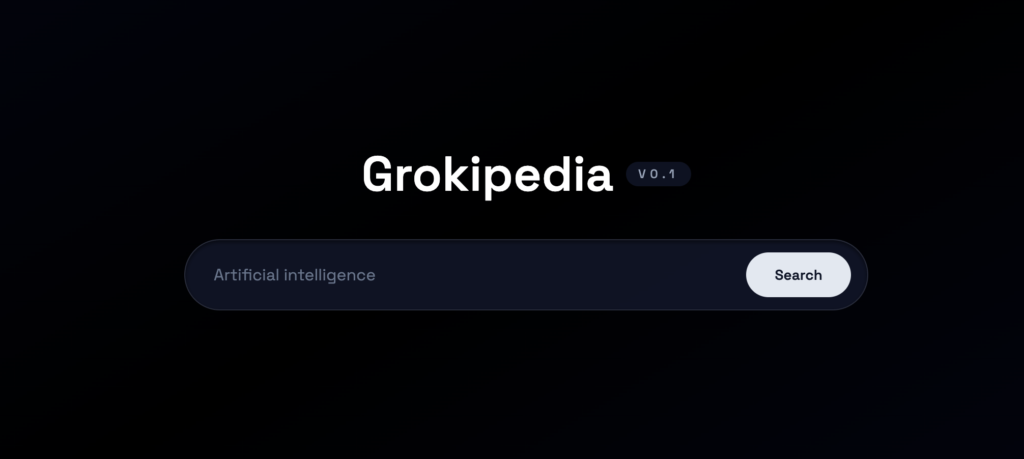
On October 27 local time, Elon Musk introduced a new knowledge tool to the internet. His AI company xAI launched Grokipedia, an AI-generated online encyclopedia platform.
Musk proclaimed on social media platform X that this would be a “massive improvement” over Wikipedia, even calling it a “necessary step” toward achieving xAI’s goal of “understanding the universe.” But this ambitious project sparked controversy just hours after going live.
What is Grokipedia?
In short, Grokipedia is an open-source encyclopedia platform proposed by xAI in September 2025, specifically designed to challenge Wikipedia. Elon Musk believes Wikipedia lacks neutrality and is riddled with bias, and his vision for Grokipedia is to surpass it in both accuracy and impartiality.
Developed by Elon Musk’s XAI team, Grokipedia uses cutting-edge artificial intelligence to create a decentralized, user-driven space for information.
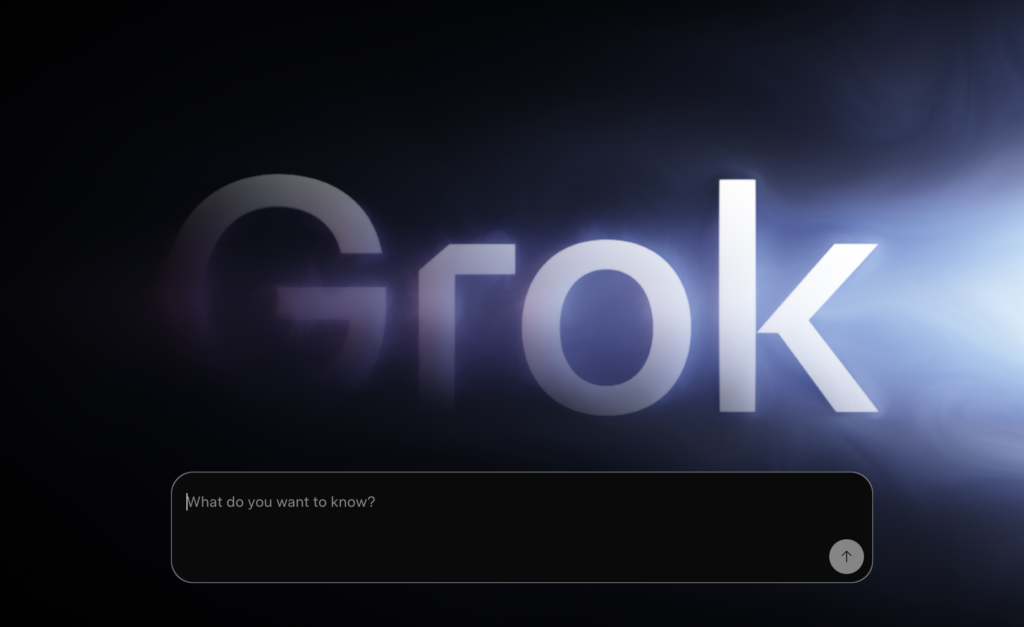
Unlike traditional encyclopedias, which are largely managed by a centralized team of editors, Grokipedia aims to democratize the process by allowing anyone to contribute and curate content.
At its core, Grokipedia offers:
- AI-Powered Content Creation: The platform uses AI to generate and verify content, ensuring accuracy and efficiency.
- Decentralized Structure: It empowers users to contribute, edit, and govern content without the need for central control.
- Advanced Search and Filtering: Grokipedia employs sophisticated algorithms to optimize search functionality, making it easier for users to find relevant information quickly.
This blend of AI technology and decentralization positions Grokipedia as a more flexible and user-driven alternative to traditional knowledge platforms.
Visually, Grokipedia does indeed mimic Wikipedia’s design. Its minimalist homepage features only a search box, while article pages employ a similar format to Wikipedia, including titles, subheadings, and citation links.
Moreover, this similarity extends beyond mere appearance. Some Grokipedia pages bear the note “Content adapted from Wikipedia” at the bottom, with entries like Yann Lecun being nearly identical word-for-word to their Wikipedia counterparts. (though Musk claims they will gradually stop using Wikipedia pages as sources).

Grokipedia is an AI-driven encyclopedia whose content is generated by artificial intelligence. All entries undergo fact-checking, bias detection, and logical consistency assessment through an algorithmic system powered by xAI.
While Musk claims this approach aims to eliminate noise and return to facts, its effectiveness is highly questionable—if Wikipedia reflects the biases of its human editors and their sources, then artificial intelligence faces the same issue: the inherent bias within the data itself.
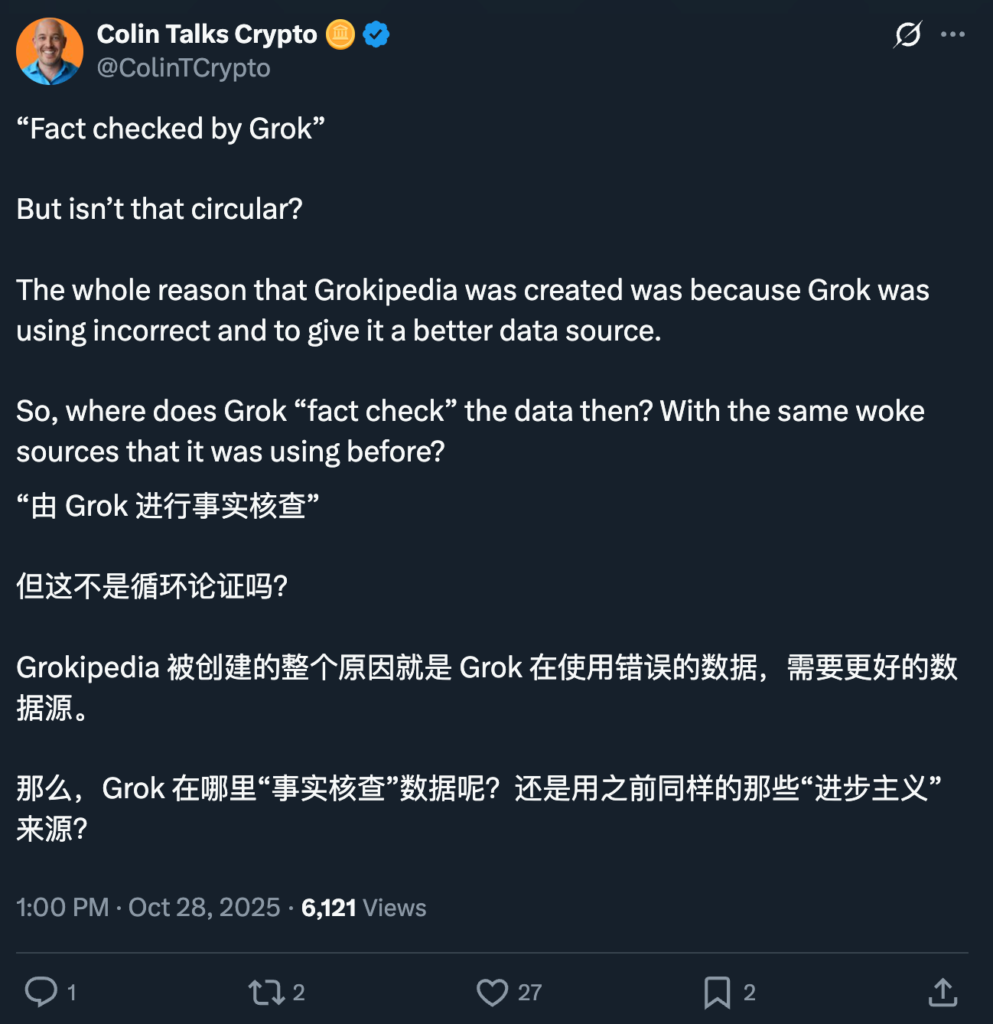
According to its official website, Grokipedia currently has 885,279 articles available, still a significant gap compared to Wikipedia’s millions of entries.
Regarding accuracy concerns, Grokipedia allows users to flag issues and provide suggested edits along with relevant links.

Some entries already have visible editing history.
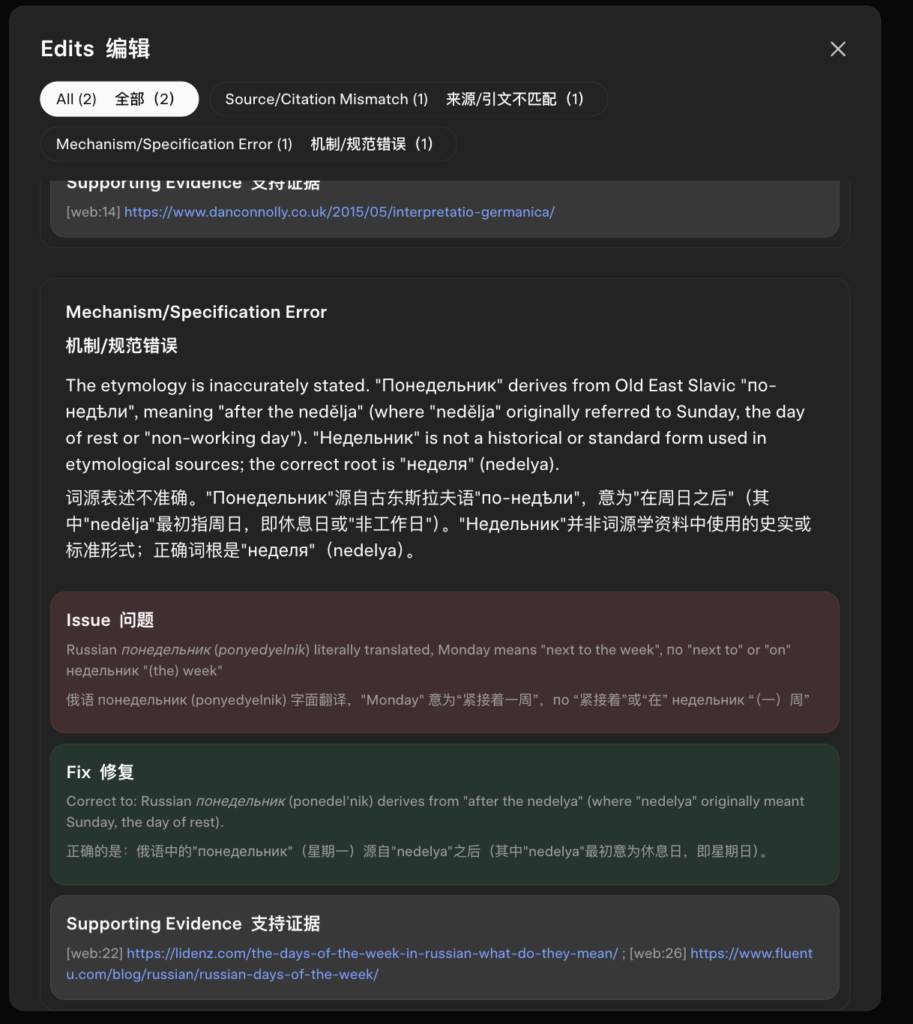
Some believe this editing model helps everyone spot long-standing errors in entries, which appears valuable.
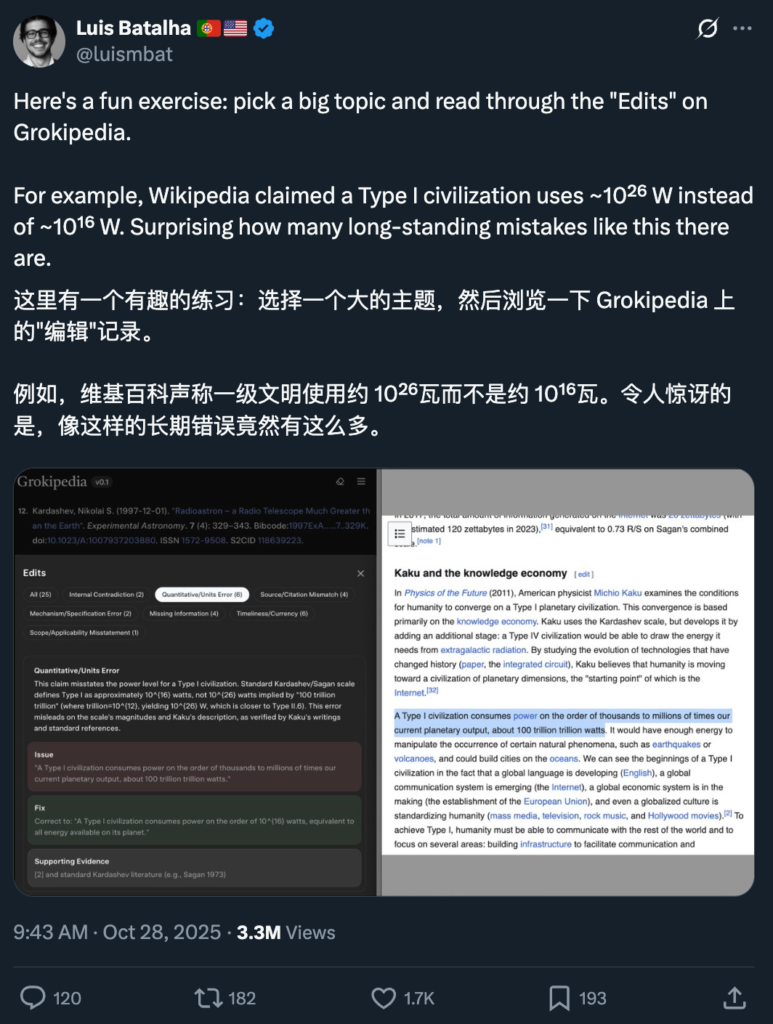
The Vision Behind Grokipedia
Elon Musk’s vision for Grokipedia goes beyond just creating another online encyclopedia. He aims to challenge what he perceives as the biases present in platforms like Wikipedia.
🧠 Challenging the Status Quo
Musk has long criticized Wikipedia for what he perceives as ideological biases, particularly a left-leaning slant in its editorial practices. He has referred to it as “Wokipedia,” highlighting concerns over systemic biases and the exclusion of certain viewpoints (The Guardian). In response, Grokipedia was conceived as a platform that aims to provide a more balanced and neutral perspective on global knowledge.
🤖 AI-Driven Objectivity
At the core of Grokipedia is Grok, an AI chatbot developed by Musk’s company xAI. Unlike Wikipedia’s human editors, Grok generates and fact-checks content autonomously, seeking to eliminate human biases and errors. This approach is intended to ensure that the information presented is as objective and accurate as possible (The Guardian).
🌐 A Step Toward Universal Understanding
Musk has articulated that Grokipedia aligns with xAI’s broader goal of “understanding the universe.” By leveraging AI to analyze and synthesize vast amounts of information, Grokipedia aspires to be a comprehensive and up-to-date repository of human knowledge, accessible to all (thedailyjagran.com).
⚠️ Controversies and Criticisms
Despite its ambitious goals, Grokipedia has faced criticism regarding its content and potential biases. Some entries have been accused of promoting right-wing narratives and omitting or downplaying certain perspectives. Additionally, concerns have been raised about the accuracy of AI-generated content and the platform’s approach to fact-checking (The Guardian).
🔮 Looking Ahead
As Grokipedia continues to evolve, it stands at the intersection of technology, information, and ideology. Its success will depend on its ability to balance the ambition of providing unbiased knowledge with the practical challenges of AI accuracy and editorial integrity. Only time will tell if Grokipedia can fulfill Musk’s vision of a more objective and comprehensive digital encyclopedia.
How Does Grokipedia Work?
The mechanics of Grokipedia set it apart from traditional encyclopedias.
The platform is built on the principle of decentralization, meaning that users can contribute to and curate content without central oversight. Here’s a closer look at how it functions:
- AI-Powered Editing and Verification: Grokipedia employs AI models to assist in editing and verifying content, reducing human error and enhancing accuracy.
- User-Driven Governance: Contributors have a say in how the platform evolves. They can vote on content changes and suggest improvements.
- Blockchain Technology: To ensure data integrity, Grokipedia uses blockchain for record-keeping, allowing transparency in content changes.
AI-Powered Content Creation
At the heart of Grokipedia is Grok, xAI’s advanced conversational and reasoning AI. Grok is responsible for generating, editing, and fact-checking articles in real-time. When a user searches for a topic, Grok either retrieves an existing entry or creates a new one, complete with references. Each page is then stored and indexed for future users, allowing the system to grow dynamically with every query. Gulf News
Decentralized Governance
Unlike Wikipedia, which relies on a centralized group of volunteer editors and administrators, Grokipedia allows users to manage and curate content through a decentralized governance system. Contributors have a say in how the platform evolves, voting on content changes and suggesting improvements. This model empowers users to contribute and oversee content without central control.
Blockchain for Transparency
To ensure data integrity, Grokipedia uses blockchain for record-keeping. This technology allows for transparent tracking of content changes, providing a verifiable history of edits and ensuring accountability in content management.
Integration with Grok AI
Grokipedia integrates seamlessly with Grok AI, enabling advanced features such as real-time fact-checking and content generation. Grok’s capabilities allow Grokipedia to deliver accurate and up-to-date information, positioning it as a next-generation knowledge-sharing platform.
Grokipedia vs. wikipedia
When comparing Grokipedia to traditional encyclopedias, several key differences emerge:
- Content Management: While Wikipedia relies on a centralized group of volunteer editors and administrators, Grokipedia allows users to manage and curate content through a decentralized governance system.
- Accuracy and Bias: One of Grokipedia’s primary selling points is its ability to mitigate biases that may influence traditional encyclopedias. With AI working alongside human contributors, content is generated and reviewed in ways that reduce subjective interference.
- Accessibility and Freedom: Unlike Wikipedia, which has policies that can restrict certain types of content, Grokipedia’s decentralized structure aims to provide a more open platform, free from the constraints imposed by central authorities.
These differences suggest that Grokipedia could disrupt the current ecosystem of online knowledge-sharing platforms.
Grokipedia vs Wikipedia — comprehensive comparison
| Aspect | Grokipedia(AI-powered encyclopedia) | Wikipedia (community-edited encyclopedia) | Key observations / sources cited |
|---|---|---|---|
| Content creation model | AI-driven content generation and updating guided by automated checks; limited direct user edits | Human-authored and edited by volunteers; open editing with editorial guidelines | AI-driven updates can accelerate coverage but raise questions about verifiability and human oversight |
| Editorial control | Centralized control via xAI governance; algorithmic fact-checking; correction requests via feedback forms | Decentralized, community-driven governance with consensus, talk pages, and transparent edit histories | Centralization vs openness is a core tension; trust models differ |
| Article volume at launch | Reported launch with hundreds of thousands of AI-generated entries (e.g., ~885k) | English Wikipedia alone exceeds many millions of articles; multi-language coverage substantial | Scale differs dramatically; initial asset base is AI-generated vs human-curated corpus |
| Update frequency | AI-powered, near real-time or rapid updates based on data streams | Slower for some topics; updates depend on volunteer editors and citation reviews | Speed of updates vs reliability and sources; AI may hallucinate if not properly constrained |
| Bias and transparency | Marketed as truth-first; concerns about AI bias, influence from corporate ownership (xAI), and data provenance | Ongoing debates about neutrality, bias, sourcing, and regional coverage gaps; strong emphasis on verifiability | Critics cite potential AI bias and corporate influence; supporters highlight transparency and open editing in Wikipedia |
| User participation | Users can submit correction requests but cannot directly edit entries | Open to all registered users; extensive user talk pages; ongoing community moderation | Participation model shapes content dynamics and trust mechanisms |
| Sources and licensing | Content may be derived from existing sources; licensing and training data provenance often discussed | Content is licensed under Creative Commons Attribution-ShareAlike; citations and verifiability are central | Licensing frameworks affect reuse and attribution; AI training data provenance remains a topic |
| Governance & sustainability | For-profit/venture-backed project (xAI) with a planned integration into AI training workflows | Nonprofit Wikimedia Foundation; relies on donations and volunteer-driven governance | Institutional model affects long-term sustainability, openness, and public trust |
| Reliability and verifiability | Emphasis on AI-driven verification; external scrutiny on accuracy and source traceability | Strong emphasis on verifiability with citations, edit histories, and community checks | The reliability question often centers on source traceability and potential AI hallucinations |
| Content replication vs originality | Some pages mirror Wikipedia content or adapt it under licensing; potential reuse in AI training | Original content creation by volunteers; mirrors rarely occur at scale; citations anchor claims | Content origin debates influence trust and editorial standards |
How does Grokipedia’s content differ from Wikipedia’s?
Elon Musk has repeatedly criticized Wikipedia for its “liberal bias,” even calling on X earlier this year to “stop funding Wikipedia.”
Yet his new product heavily relies on the very knowledge base he has criticized.
Lauren Dickinson, a spokesperson for the Wikimedia Foundation, noted with some irony: “Human-created knowledge is the very foundation upon which AI companies generate content; even Grokipedia requires Wikipedia to exist.”
The first wave of netizens rushing in to gawk soon discovered a bittersweet truth: countless entries on Grokipedia were essentially copied and pasted from Wikipedia.
Search for “MacBook Air,” scroll to the very bottom of the page, and a line of small print caught my eye: “Content adapted from Wikipedia…”
But for entries like PlayStation 5, they couldn’t even be bothered to make changes—they practically copied the original Wikipedia text word for word, line for line, without even adjusting the punctuation. It’s a pixel-perfect replica.
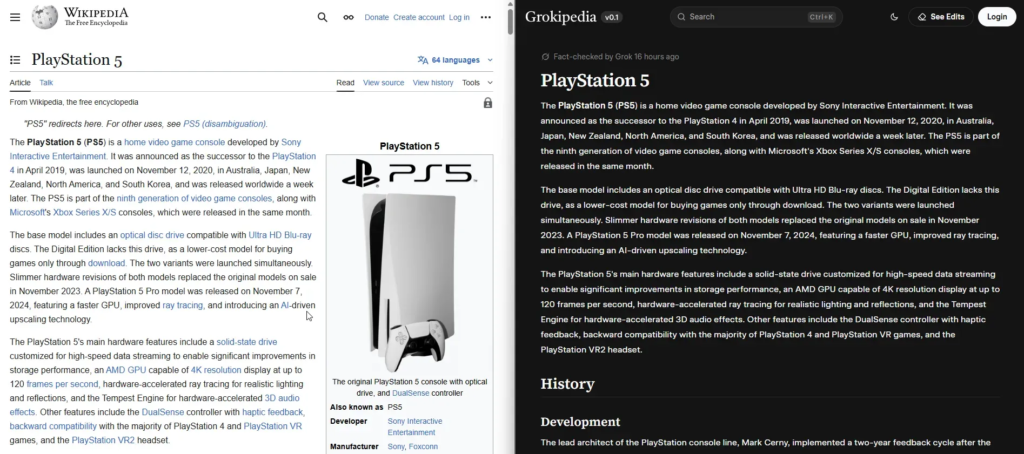
However, not all content is directly sourced from Wikipedia. The “original” sections actually best reflect the platform’s stance. On gender identity, Wikipedia defines gender as “the sum of social, psychological, cultural, and behavioral aspects,” while Grokipedia simplifies it to “a binary classification based on biological sex.”
Unsurprisingly, the platform employs derogatory terminology on topics like transgenderism, suggesting social media may contribute to increased transgender populations, with many statements perpetuating stigmatizing narratives about specific groups.
Significant differences also emerge in climate change coverage. Wikipedia states unequivocally: “The scientific community is almost unanimous in its conclusion that the climate is warming, and that this warming is caused by human activity.”
Grokipedia’s version, however, questions this “near-unanimous scientific consensus,” suggesting that media and environmental organizations “fuel public panic” by framing climate issues “as existential threats, but not always based on commensurate empirical evidence.”
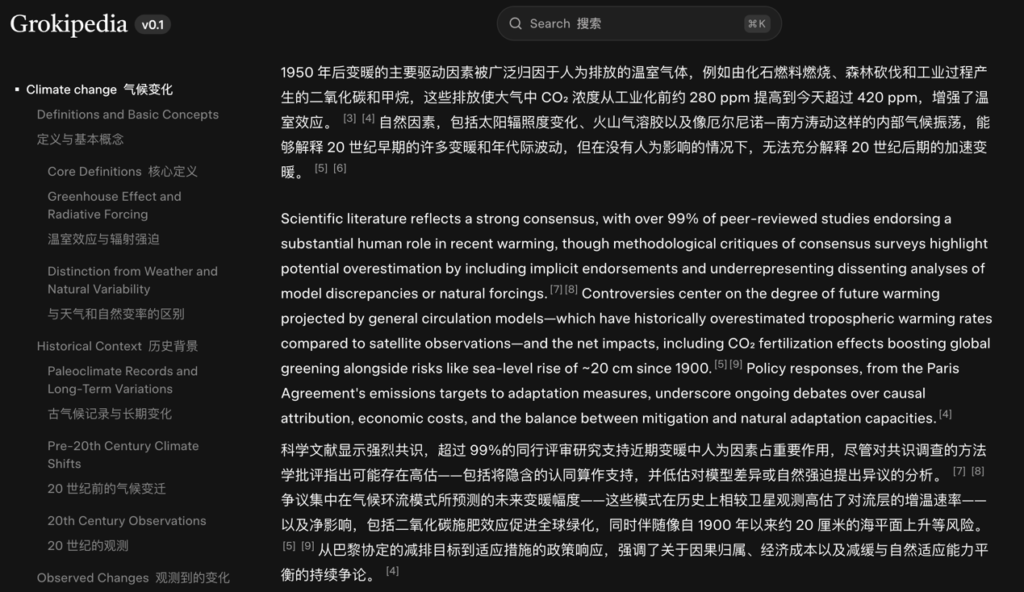
For Musk himself, Grokipedia’s description is naturally full of praise. The site’s Musk entry runs nearly 11,000 words and includes over 300 citations, surpassing even Wikipedia’s 8,000-word version in detail.
The article states he “ensures AI safety through truth-oriented development rather than burdensome regulation,” featuring dedicated sections such as “Criticism of Regulation and Woke Culture.”
In contrast, Wikipedia documents his controversial gesture at a rally this past January, while Grokipedia makes no mention of it whatsoever.
This selectivity is equally evident in coverage of political events. The page on the January 6, 2021, Capitol Hill incident blends facts with insinuations, attempting to downplay Trump’s responsibility.
Grokipedia even targets media outlets critical of it, labeling WIRED magazine as “having descended into far-left propaganda” in its entry.
Beyond ideological biases, these content leanings also stem from inherent technical limitations. While Grokipedia claims articles undergo “fact-checking” by Grok, the large language model’s intrinsic “hallucination” issues cannot be entirely eliminated.
Media outlets discovered that the section on Musk’s work at the U.S. Department of Efficiency contained misinformation about Ohio gubernatorial candidate Vivek Ramaswamy.
Grokipedia asserted that Ramaswamy “assumed a more prominent role” after Musk’s departure in May, despite Ramaswamy having left the organization in January—before it became part of the Trump administration. To support this false claim, Grokipedia cited articles from the BBC and Al Jazeera, neither of which mentioned Ramaswamy at all.
And this is precisely the fundamental difference between the two models. Since its founding in 2001, Wikipedia—despite controversies and imperfections—has become the world’s ninth most visited website thanks to its transparent editing process, volunteer oversight, and culture of continuous improvement.
Anyone can view edit histories, participate in discussions, and make corrections. In contrast, Grokipedia operates with complete opacity. Users cannot directly edit pages but can only report errors via forms. Crucial questions remain unanswered: how articles are generated, who reviews them, and what criteria are used.
Why Grokipedia Matters
🧠 A New Era in Knowledge Sharing
Grokipedia leverages advanced AI technology to create, edit, and fact-check content, offering a dynamic and real-time knowledge base. Unlike traditional encyclopedias that rely on human editors, Grokipedia’s AI-driven approach allows for continuous updates and immediate corrections, ensuring that information remains current and accurate.
⚖️ Addressing Perceived Biases
One of the primary motivations behind Grokipedia’s creation is to address concerns about ideological biases in existing platforms like Wikipedia. Elon Musk has criticized Wikipedia for what he perceives as a left-leaning bias, particularly in its editorial processes. Grokipedia aims to provide a more balanced perspective by utilizing AI to analyze and present information without human-imposed biases.
🌐 Democratizing Information Access
Grokipedia’s open-source model democratizes access to information, allowing users worldwide to contribute to and benefit from a vast repository of knowledge. By removing traditional barriers to content creation and curation, Grokipedia fosters a more inclusive and participatory environment for knowledge sharing.
🔍 Enhancing Accuracy and Reliability
Through AI-powered fact-checking and content generation, Grokipedia aims to enhance the accuracy and reliability of its entries. The platform continuously learns and adapts, improving its ability to detect and correct errors, thereby providing users with trustworthy information.
🚀 Paving the Way for Future Innovations
Grokipedia represents a significant step forward in the evolution of digital knowledge platforms. Its innovative use of AI technology sets the stage for future advancements in how we create, share, and consume information. As the platform continues to develop, it holds the potential to influence the broader landscape of online knowledge sharing.
Criticism and Challenges of Grokipedia
As with any groundbreaking technology, Grokipedia faces its share of criticisms and challenges:
- Misinformation and Accuracy: One of the primary concerns is how Grokipedia will handle misinformation. Even with AI’s help, ensuring accuracy and combating fake news on a decentralized platform is a complex challenge.
- Governance Issues: The platform’s decentralized nature raises questions about governance and how content will be moderated. Without a central authority, will Grokipedia become a breeding ground for spam or malicious content?
- Sustainability: Given the ambitious nature of the project, some skeptics wonder about Grokipedia’s long-term sustainability. Can the platform scale without losing its core values of openness and accuracy?
Despite these challenges, Grokipedia is committed to tackling these issues head-on, leveraging technology and community involvement to maintain the integrity of its content.
The Future of Grokipedia
Looking ahead, Grokipedia holds significant potential for growth. Its AI-powered features, combined with its decentralized model, make it an attractive alternative to traditional knowledge-sharing platforms.
In the coming years, we can expect Grokipedia to expand its content offerings, refine its AI algorithms, and attract more users.
The platform’s ability to scale globally will be key to its success. As it grows, Grokipedia has the potential to become a major player in the knowledge-sharing landscape, influencing everything from education to media to how we interact with information online.
Conclusion of Grokipedia
In conclusion, Grokipedia represents Elon Musk’s bold vision for the future of knowledge sharing. By leveraging AI, decentralization, and blockchain technology, Grokipedia has the potential to revolutionize how we access and contribute to information.
While it faces challenges, its commitment to free speech, accuracy, and user-driven governance makes it a platform to watch.
If you’re curious about exploring Grokipedia or contributing to its development, now is the perfect time to dive in and be part of this transformative movement.
Reference
- CNBC: Elon Musk’s Grokipedia goes live
- The Verge: Elon Musk’s Grokipedia launch
- NBC News: Grokipedia as an alternative to ‘woke’ Wikipedia
- NYT: Elon Musk Challenges Wikipedia With His Own A.I. Encyclopedia
- Bloomberg/Business Insider: Grokipedia as a competitor to Wikipedia
- CNBC (another angle on the launch)
- Reuters: Musk’s Grokipedia launches as Wikipedia rival
- Euronews: Grokipedia AI-powered encyclopedia launch
- France 24: Grokipedia competes with Wikipedia
- ABC News (AU): Grokipedia vs Wikipedia
- The Hill: Grokipedia vs Wikipedia
- The Financial Times: Grokipedia coverage (if available)
- TechCrunch: Grokipedia launch and initial reception
- Wired: Grokipedia coverage and analysis
- The Guardian: Grokipedia coverage and editorials
- Financial Times Alphaville: Grokipedia discourse
- MIT Technology Review: Grokipedia analysis
- Bloomberg: Grokipedia market and policy context
- TechRadar: Grokipedia quick take
- Gizmodo: Grokipedia exploration
- Ars Technica: Grokipedia technical breakdown
- Mashable: Grokipedia user experience
- Engadget: Grokipedia early impressions
- Reuters World News: wider context on AI encyclopedias
- AP News: Grokipedia briefing and facts
- Associated Press: technology briefings
- CNBC International: global coverage of Grokipedia
- Financial Post: Grokipedia coverage (Canada)
- South China Morning Post: Grokipedia angle in Asia
- Nikkei Asia: Grokipedia coverage
- The Hindu: Grokipedia in India
- South China Morning Post Tech Daily: Grokipedia update
- Elon Musk Unleashes Grokipedia: The AI-Driven Rival to Wikipedia
